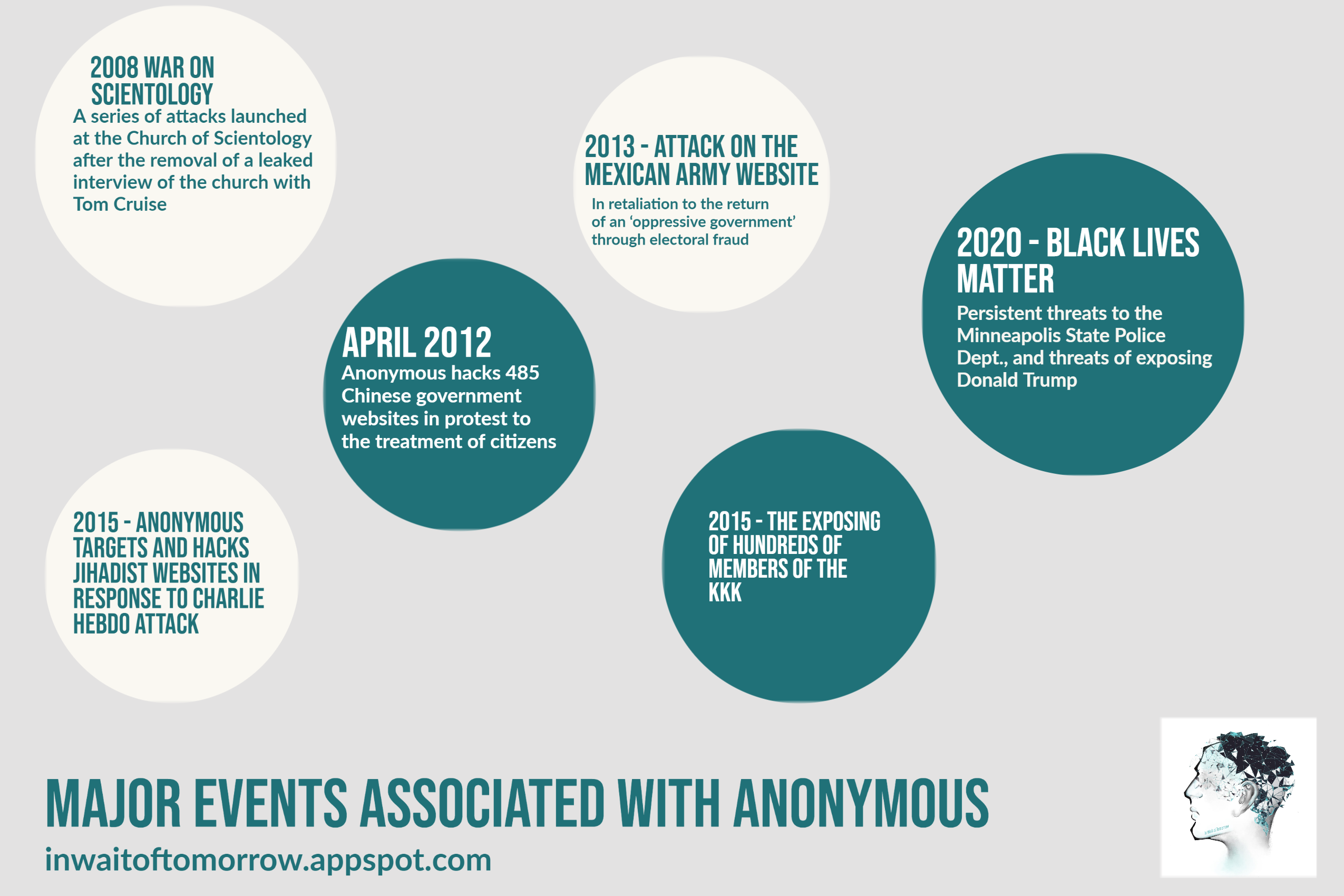The resurgence of Anonymous and the effects of hacktivism

On 25th May 2020, the sickening murder of George Floyd prompted widespread uproar against ongoing police brutality against the black community. Amidst the riots and the protests, hacktivist movement ‘Anonymous’ seems to have reappeared, hacking both the Minneapolis Police Department and Senate websites.
Following this, Anonymous have threatened to expose the ‘many crimes’ of the Minneapolis State Police Department, and to publicise Trump’s ‘dirty laundry’ along with Jeffrey Epstein’s ‘little black book’. Whether they have much more to expose is up for debate, but it’s clear that they are fighting for not just our black communities, but for some transparency in law enforcement and politics. I think something that has become so apparent in recent weeks is just how unaware most of us are to the extent to which police brutality exists, both in the US and UK. We’ve only seen what’s on camera. Anonymous may threaten to expose it all.
What is hacktivism?
Hacktivism is the intersection between hacking and activism: politically motivated hacking. Most common responses involve defacing websites to promote their own message, which tends to quickly result in the website being ‘shut down for maintenance’ as the organisation desperately attempts to reclaim their own website.
Anonymous is the most well-known hacktivist group, having been around since 2003. They were particularly active in the early-to-mid 2010s when terrorist organisations, such as the ‘Islamic State’, captured many of the headlines. They are completely decentralised, which means that there isn’t just one figure dictating and delegating their activity, and they act independently as separate sub-groups across the world. Their resurgence comes to the aid of the powerful Black Lives Matter movement at such a critical time. But how much of an effect can groups like Anonymous actually have?
The effects of hacktivism
More than 4 billion people worldwide use the internet, with almost 3 billion being active on social media. Ofcom’s annual news consumption report showed that half of adults in the UK used social media as their main news source. This gives Anonymous such a huge platform.

Their first attack since their return was the cyber-attack on the Minneapolis State Police Department website. They did this by flooding the website’s server with data, causing an overload – similar to a website which has too many users at once. Within a day, the entire world had heard of Anonymous’ return. Not to mention the images of Donald Trump which have spread like wildfire.
There are many ways to launch a cyber-attack, including what’s mentioned above. The stranger part of hacktivism is that groups such as Anonymous have to announce their intention to attack before doing so, otherwise they can’t take credit once complete. For example, in 2013, Anonymous campaigned against US banks and the government and released a long list of websites, such as the NSA and Bank of America, which they intended to hit.
Another common attack is doxing, which is publicising an opponent’s personal or private information to embarrass them. If ever you doubted the effectiveness of hacktivism, just know that over the past decade, Anonymous has doxed hundreds of members of the Klu Klux Klan.
An uncensored, decentralised internet?
Many hacktivists are anti-cyber-surveillance. They are against the monitoring of computer activity and storage of user’s data over the internet. With most websites, you have some element of control over what happens when you provide your email address and you’re asked for consent or to read some terms and conditions. But we’ve seen in the past where big corporations use our data in ways we didn’t consent to, and it has made history.
The Cambridge Analytica scandal is one most of us should be aware of. This was the biggest misuse of user’s data and cyber-surveillance; the very thing hacktivists are fighting against. Over the course of the US presidential election and the Brexit referendum in 2016, Facebook knowingly allowed over 87 million profiles to be targeted by the company Cambridge Analytica for the interests of Donald Trump and the Brexit campaign. Both campaigns were allowed to build psychological profiles on the users and target certain users with specific messages and ads which would help secure their vote. They chose what some people were able to see on the internet, hijacking the very democracy that they sold as part of their manifesto. This raises the question, how much of what we see on the internet is actually controlled?
According to Reporters Without Borders, The UK is amongst one of the more liberal countries in the world when it comes to internet censorship. The countries seen as stricter include China and Saudi Arabia. However, last year the UK brought in plans for state regulation of content on social media and the internet. This would mean an increase in censorship. As of February 2020, it was proposed that Ofcom would be the state regulator, and companies like Facebook and Twitter would be legally required to protect their users. The regulator Ofcom will have the ability to impose fines to social media companies, and block access to sites.
Whilst this change was made to protect the user from violent media and misinformation, some have argued that this is a threat to our freedom of speech. It’s clear that there’s so much harmful content and ‘fake news’ content on the internet, which we should be protected against, but is government censorship just a lazy attempt to solving a deeper issue in society? It’s undoubtedly going to cause many different concerns over the future… after all, state regulation will never be flawless.
Sign up to recieve our newsletters
Don't miss out on our latest content!
Recent posts

Pramod Kumar | 2022-03-04
How Are Investments in Genomics Driving Research Projects?
Science, Healthcare, Business | 4 min read

Dillon Lad | 2021-07-10
4 ways we're destroying the environment without even realising
Environment | 4 min read

Dillon Lad | 2021-04-26
The science behind The Matrix: can we power the world with our own mind and bodies?
Technology, Science, Film | 4 min read

Dillon Lad | 2021-01-29
Breaking up Big Tech with a decentralised internet for the future
Technology | 4 min read
